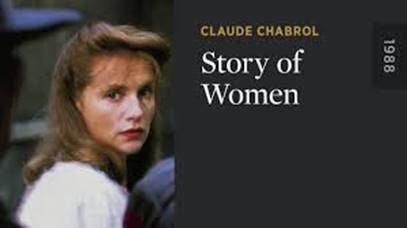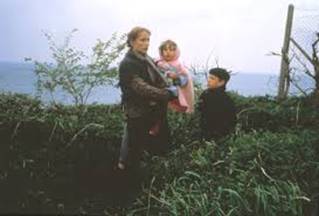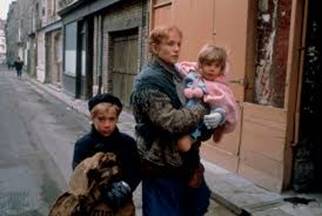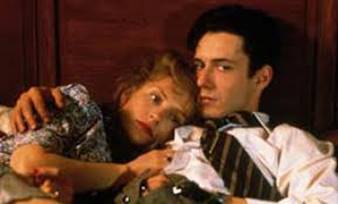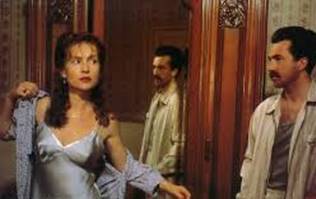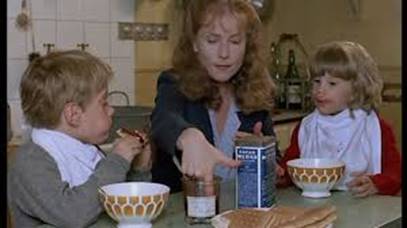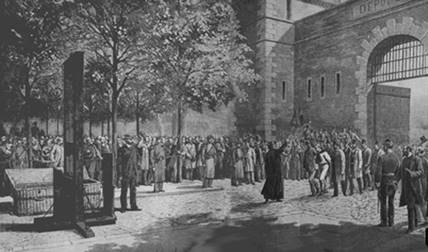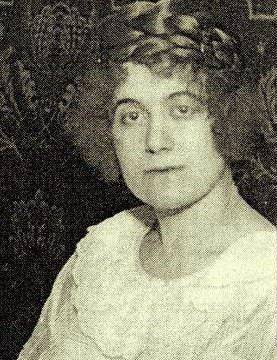Hanna Diamond
Cardiff University
Claude Chabrol’s Une affaire de femmes (1987) deals with the events in the life of Marie-Louise Giraud which led to her being guillotined on 29 July 1943 by the Vichy regime for acts of abortion. It is considered by many to be one of the most accomplished films he made in collaboration with Isabelle Huppert, who won the best actress award at the Venice film festival in 1988 for her portrayal of Marie Latour. The script is “liberally inspired” by Francis Szpiner’s retelling (1986) of Marie-Louise Giraud’s story, a case he sees as more powerfully emblematic of the period than any history book. [1] In the early 1980s, Szpiner, a high-profile lawyer became fascinated with how Giraud, a 40-year-old woman, could have been guillotined for carrying out abortions. He pursued his research until he was granted permission to consult the files relating to her case held in the French National Archives. This material, supplemented with interviews with colleagues who recalled the events of the period, allowed him to craft a narrative reconstructing Giraud’s life and the details of her trial which, in turn, Chabrol dramatized. After first providing an overview of the film, this discussion will explore the cinematic choices Chabrol made in relation to Szpiner’s account. It will go on to set out how the film connects to historical debates about the period and will close with a consideration of the film’s impact and its ongoing relevance to broader debates about abortion.
Overview of the film
The film opens with Marie struggling with her toddler, Mouche, and son, Pierrot, collecting nettles on the cliffs just outside Cherbourg. These shots set the tone for the early part of the film. Life feels drab and cold. Clothes are threadbare and well-worn. Marie struggles to tend to her two children, trapped within the confines of domesticity. She tries to be a loving parent, but she longs for more. Money is tight. She manages with the limited income she receives from her absent POW husband Paul’s military salary and prepares whatever food she can muster for the children. When her neighbour falls pregnant with an unwanted child, Marie feels for her and helps her to terminate her pregnancy. Excited by the success of her efforts and thrilled with the record player her neighbour gifts her in return for her help, Marie recognises that “helping” other women to resolve their “problems” could bring her tangible benefits. It could offer her a way out, potentially even allowing her to take forward her ambition to sing on the stage. She actively sets about to establish herself, gradually growing her clientele as her reputation spreads by word of mouth.
In the midst of all this, while the seeds of her “business potential” were still taking root in her mind, Marie’s husband returned home after two years absence. Released under the terms of the Relève POW exchange scheme, his unexpected appearance does not bring about the happy reunion that we might anticipate. In a key moment in the film, the family gets home from an exhausting food foraging expedition digging up potatoes at a farm in the bleak countryside to discover Paul asleep in the family’s double-bed, still in uniform. Marie is nonplussed by his return. She fends off his advances and asserts that she does not love him.
Meanwhile, as knowledge of the “service” Marie can offer spreads, the number of women visiting the house for terminations increases and the family’s circumstances start to improve. Marie acquires new outfits, family meals become more copious and they move to a larger, more comfortable apartment. She even takes on a maid. Paul appears resigned to his relegated position as a mere onlooker to her activities. Working intermittently, he busies himself making collages and settles for living off her materially as their affluence grows.
A chance meeting with a local prostitute, Lulu, whom Marie befriends, offers a further opportunity for financial gain as the prostitute agrees to hand over a cut of her takings in exchange for hourly use of one of Marie’s bedrooms. Another prostitute soon follows. Marie takes up with Lucien, an arrogant collaborator and attempts to set Paul up with her maid so he will leave her in peace. In another crucial scene, Paul returns home to find Marie asleep with her lover in the marital bed. Finding himself relegated to the single bed in the spare room, Paul writes an anonymous letter of denunciation which brings Marie’s activities to the attention of the authorities and leads to her arrest. Marie is taken to Paris to be tried by Vichy’s Tribunal d’État and is found guilty of carrying out 23 abortions. She was guillotined soon after her request for a pardon was personally refused by Maréchal Pétain.
Chabrol’s narrative choices
While the narrative focuses on Marie, Chabrol used the film to draw attention to the difficulties faced by women who found themselves with an unwanted pregnancy. Men played very little part in helping them to manage this situation. It was truly une affaire de femmes, women’s business. Marie’s clients find themselves in difficulty because they have strayed from their marriages in the absence of prisoner husbands, have had adventures with German soldiers, or quite simply are not in a financial position to support a child or cannot cope with another. This is the case of Jasmine, the station master’s wife. In this tragic subplot, somewhat embellished in relation to Szpiner’s account, Jasmine approaches Marie for help disposing of her seventh pregnancy. Having had six children in seven years, she is completely overwhelmed. Marie agrees to help but some weeks after the abortion receives a visit from Jasmine’s sister-in-law informing her both of Jasmine’s death due to complications arising from the abortion and the subsequent suicide of her husband, leaving the children in her care. For Marie, this is the first indication that her methods are not always successful, and she protests that she cannot be held responsible for the outcome as the woman did not return to ask for her help. While the local women undertake to keep silent about the part Marie had played, Marie is left troubled by this encounter, particularly the devout catholic woman’s assertation that babies in their mother’s bellies have souls.
Chabrol cultivates a certain ambivalence in his presentation of Marie.[2] She has some endearing qualities which are evident in certain touching scenes with the children, but she also abandons them for a night out drinking with her friend and appears to neglect them for hours at a time. One area where the film diverges from Szpiner’s account is in the repeated references to Giraud’s “vulgarity,” a trait which is not really made apparent in the film. It would be hard for Huppert to seem vulgar. Chabrol presents Marie more as an opportunist. She seems unworldly and naïve rather than coarse and rude. As Marie reflects on the success of her first abortion, she recognises that what she first did out of compassion and friendship could became a way for her to better her circumstances and escape the boredom and drudgery of her lot. She knows that her activities are illegal because she says to Lulu, “I do things that are forbidden. I could be useful to you.” This effort to make herself more interesting to her new friend as well as to expand her clientele reveals that she is not unaware of the line she is treading. If she is conscious that she is breaking the law, however, she has no idea about the Vichy change to the law on 15 February 1943. This made abortion a much more serious offence than before amounting to a crime against the State to be judged in the highest court, the Tribunal d’État.
Chabrol’s decision to make Paul the author of the anonymous letter reflects his concern to show the extent to which the male/female divide permeated French society at that time. In the film, the letter precipitates Marie’s shift from the relative safety of an intimate community of women where she was fulfilling a necessary role, and projects her into the world of men where she would be exposed and judged. In so doing, Chabrol makes Paul responsible for putting her in serious danger, an act of revenge which is coherent in plot terms. Marie had felt safe while she operated in the privacy of her own home and believed that knowledge of her activities was confined to a community of women who were complicit in her actions as those who had abortions were also targeted by the law. However, Szpiner’s account references Marie’s denunciation by a number of anonymous letters mainly from women and neighbours. One of these letters even provided the names of a number of Marie’s clients with the result that they also faced prosecution although they did not receive such severe sentences. Such letters of denunciation were very common at the time. Most were anonymous and were extremely useful to the authorities as a way of policing populations. Szpiner recounts how Giraud was renowned in the neighbourhood and when the case was first heard in the local Cherbourg courts, witnesses who testified sought to exaggerate her guilt, even invent further crimes, presenting her as a bad mother, an accusation she successfully refuted. Chabrol’s depiction of female solidarity in this context therefore seems somewhat romanticised.
On the other hand, he plays down the role of the women fortune-tellers who emerge as a vital source of support and information-sharing for women in the community. In the film, Marie only makes a brief mention of her visit to a fortune-teller in one of her exchanges with Paul. But in Szpiner’s account, they emerge as key figures whose role was not just to comfort women with their reassuring predictions about a more comfortable future, but they also played central roles in directing women to Giraud for abortions. They were privy to women’s most intimate and private confidences as one recounts to Giraud in the book: “[Women] prefer to confess to me, a woman, than [to a priest] at church.” When the women revealed that they are in trouble as a result of an affair with a German soldier and need an abortion, the fortune-teller was able discreetly to pass on Giraud’s details. Where Chabrol only shows us Marie on trial, in Szpiner’s account two of these fortune-tellers were taken to court, as well as Marie’s maid who was also accused of aiding in the process. This was despite her testimonies against Giraud. The presence of Giraud’s three accomplices in court made it possible for the prosecution lawyers to present Giraud as orchestrating a network of criminals.
Chabrol’s use of Marie’s son, Pierrot, as narrator, was not universally appreciated by critics. It is only at the end, in the voiceover during the scene of Marie’s arrest, when Pierrot says: “I was seven. She wasn’t much older in her head” that Charbol reveals that the events presented are as they are remembered through Pierrot’s adult eyes. The child is ever present in the film. A frequent, unwelcome witness to adult conversations, he overhears angry arguments between his parents, and peers through keyholes trying to make sense of the “procedures” taking place in the kitchen. Whatever Marie’s failings as mother, it is clear that he adored her. His face lights up whenever she notices him, and he often feels ousted in his mother’s affections by his little sister Mouche. When Paul returns, Pierrot is visibly alarmed fearing his father’s presence will further distract Marie’s attentions away from him. Yet, when questioned by Paul, who is aware that the child is party to the various “goings-on,” Pierrot informs on Marie. Later, we see him being bullied in the school playground where he learns of his mother’s fate. And in the closing scene, just after Marie’s execution, a caption appears urging us to “Take pity on the children of those who are condemned.”
Historical debates relating to gender
The film brings to light the wider gender politics of the period exemplified by Vichy’s attitude to abortion. Concern to boost the birth-rate was central to the regime’s ambitions for national renewal. A key plank of the National Revolution was the policy that women should embrace their maternal duty and have as many children as possible. This was the rationale for the strengthening of the anti-abortion laws. When Marie learns that she is to be taken to Paris for her trial, she thinks it must be a mistake. Her lawyer struggles to make her see the danger of her situation and his concern that the government might make an example of her. “An example of what?” she retorts. He tries to explain that moral questions have become an affair of state. Marie is bewildered by this. Having followed earlier advice to confess and promise never to do it again, she had believed that in showing remorse, and promising never to perform abortions, she would be treated more sympathetically. Marie finally understands that she is being targeted both for her class and her gender. She asserts; “It’s easy not to get into trouble when you are rich. They are all men, what do they know?”
During her trial, Marie is reprimanded not just for her acts of abortion but also for her morality and her decadent way of life. The fact that she benefitted from the takings of prostitutes is seen as further moral transgression for which she must be punished. The subtext is that women should be forced to have children and become mothers even against their will. It becomes clear that the regime intends to punish Marie as a deterrent to others, as a way of frightening women into conforming. Marie comes round to accepting that she might face a ten-year prison sentence so when the death sentence is announced, her cellmates are as shocked as her lawyers by the severity of her punishment. The true extent of Vichy’s hypocrisy is highlighted in the final scenes of the film when Marie’s lawyer comments that the government is deporting Jewish children at the same time as killing a woman for abortions. Men fail Marie to the very end. Her defence lawyer chooses to send a trainee to inform her that her appeal to Maréchal Pétain for a pardon was unsuccessful and that her death sentence is therefore upheld.
The film asks whether Marie really deserved this punishment. Her crime does not seem comparable to that of the communist resisters who were tried in the Tribunal d’État and condemned to death for political actions in opposition to the Vichy regime and the German authorities. Marie, on the other hand, was simply motivated by the ambition to offer her family more material comfort and improve her own prospects in life. By the end, she has come round to believing that Maréchal Pétain must be right, and she deserves her punishment. Marie was doubtless an unscrupulous opportunist who benefited financially from desperate and vulnerable women, but she was sympathetic to the plight of her clients and her crimes did not warrant the sentence that was passed on her. She was punished for her efforts to strive for a measure of independence, however morally ambiguous the nature of that independence might appear. In that sense she can be seen as a forerunner to the femmes tondues. At the Liberation, these women were publicly taunted and paraded after having their heads shaved as punishment for having had relationships, or having been implicated in some way, with the Germans. This wave of disproportionate gender-based violence often included beatings, even sometimes rape. Young resisters worked up the crowds to target these women who were severely judged for the sexual and other choices they had made during the Occupation.[3]
Part of the power of the story is that despite the fact that it is set in a heavily occupied area of France, while a few German soldiers appear, mainly in passing shots patrolling the city, they are present only as a backdrop. The emphasis is on the French story of life under Occupation and the workings of Vichy. Little explicit mention is made of German involvement in the circumstances of the period apart from the disappearance of Marie’s friend Rachel who is Jewish, an incident which Chabrol invented for the film. A shooting scene is another addition which offers some wider context. We are left to assume that the killing of the individual in the street is a resister attempting to escape arrest. Certain critics have sought to read the characters on a metaphorical level. Paul, for example, could be seen to embody the crisis of French masculinity brought by the defeat of France. Later in the film after Paul accuses Marie of having a lover, he scolds Pierrot for eavesdropping and quietly refers to him as “fils de cocu” perhaps intended as a metaphor for France’s occupation by Germany.
Contemporary resonances
The film appeared before women’s and feminist historians turned their attentions to in-depth studies of the history of the Second World War period and this makes the film remarkably ahead of its time.[4] Chabrol highlights the particular circumstances faced by women in relation to Vichy’s policy on abortion and in so doing sheds light on the conditions of women’s lives during the period. Most importantly, the subject matter of the story reveals the agonies women faced if they had the misfortune to fall pregnant. 11 other people appeared before the Tribunal d’État for abortion-related crimes; several were sentenced to life imprisonment. Only one other person, a man, was guillotined. Found guilty of performing abortions on three women, his punishment was rationalised by his failure to reform, despite two former convictions for the same crime. Abortion was very widespread and convictions for abortion more than tripled between 1940 and 1944. After the Liberation, the Tribunal d’État disappeared, as did the death sentence. The law reverted to the old 1920 version but even so, women still risked prison sentences of up to ten years if they were found guilty of abortion. Although the sentencing gradually became less harsh, this same law remained in place right up until abortion was finally legalised in 1975. Abortion only became freely accessible to all French women in 1981 when it was finally agreed that the intervention could be reimbursed by social security (Sécurité sociale). This was just six years before the release of the film.
Many commentators assert that Chabrol was seeking to make a more general point about the issue of abortion, not just about the past but also in relation to women’s right to choose in the present. The film’s reception reveals the extent to which abortion was still a live issue at that time. Although it eventually had considerable commercial success, on its release it met opposition and controversy both in Europe and in the US. On the DVD, the producer explains that the film was seen to be so controversial that he struggled with its distribution. In the end, he was forced to take exceptional measures and set up his own company in order to ensure its distribution in the US. In France, as in the U.S., abortion remains an area of vociferous contestation. In 2014 a lawassed banning any attempt to prevent women from obtaining information about abortion services and allowing women to obtain an abortion during the first 12 weeks of pregnancy without any need to cite a reason. Until that point, they only had a legal right to terminate an abortion if they were in a situation of “distress.” Abortion remains an ideologically sensitive topic and is still under threat.
In conclusion, at a time when debates are raging about accuracy and the place of history on-screen, Story of Women is exemplary. While Chabrol’s presentation diverts considerably from the historical record of Marie-Louise Giraud’s life in a number of respects, his film about Marie Latour offers a compelling narrative that is historically insightful and also resonates on a contemporary level. Meticulous care is taken with the decor and the cinematography shows a genuine concern for authenticity in its recreation of the period. The final word should perhaps go to Francis Spinzer who deserves to be acknowledged for being the first to bring Marie-Louise Giraud’s extraordinary story to public attention.
Claude Chabrol, Director, Une affaire de femmes [Story of Women], France, 1988, Color, 108 min, MK2 Productions, Films A2, Les Films du Camélia
NOTES
- Francis Szpiner, Une affaire de femmes: Paris 1943 Execution d’une avorteuse (Mayenne: Editions Balland, 1986).
- For an extended discussion of this ambivalence, see Leah Hewitt’s chapter on the film in her monograph, Remembering the Occupation in French film: National Identity in Postwar Europe (New York: Palgrave Macmillan, 2008).
- See forthcoming work from Charlotte Warmsley, ‘Victims, perpetrators and bystanders: reconceptualising head-shaving in Liberation France and Civil War Spain as gender-based violence.’ Unpublished doctoral thesis, Cardiff University, 2021.
- See, in particular, Miranda Pollard, Reign of Virtue, Mobilising Gender in Vichy France (Chicago and London: Chicago University Press, 1998) who discusses the film and for information about abortion, my own book, Women and the Second World War in France: choices and constraints 1939-48 (Abingdon and New York: Longman, 1999).

